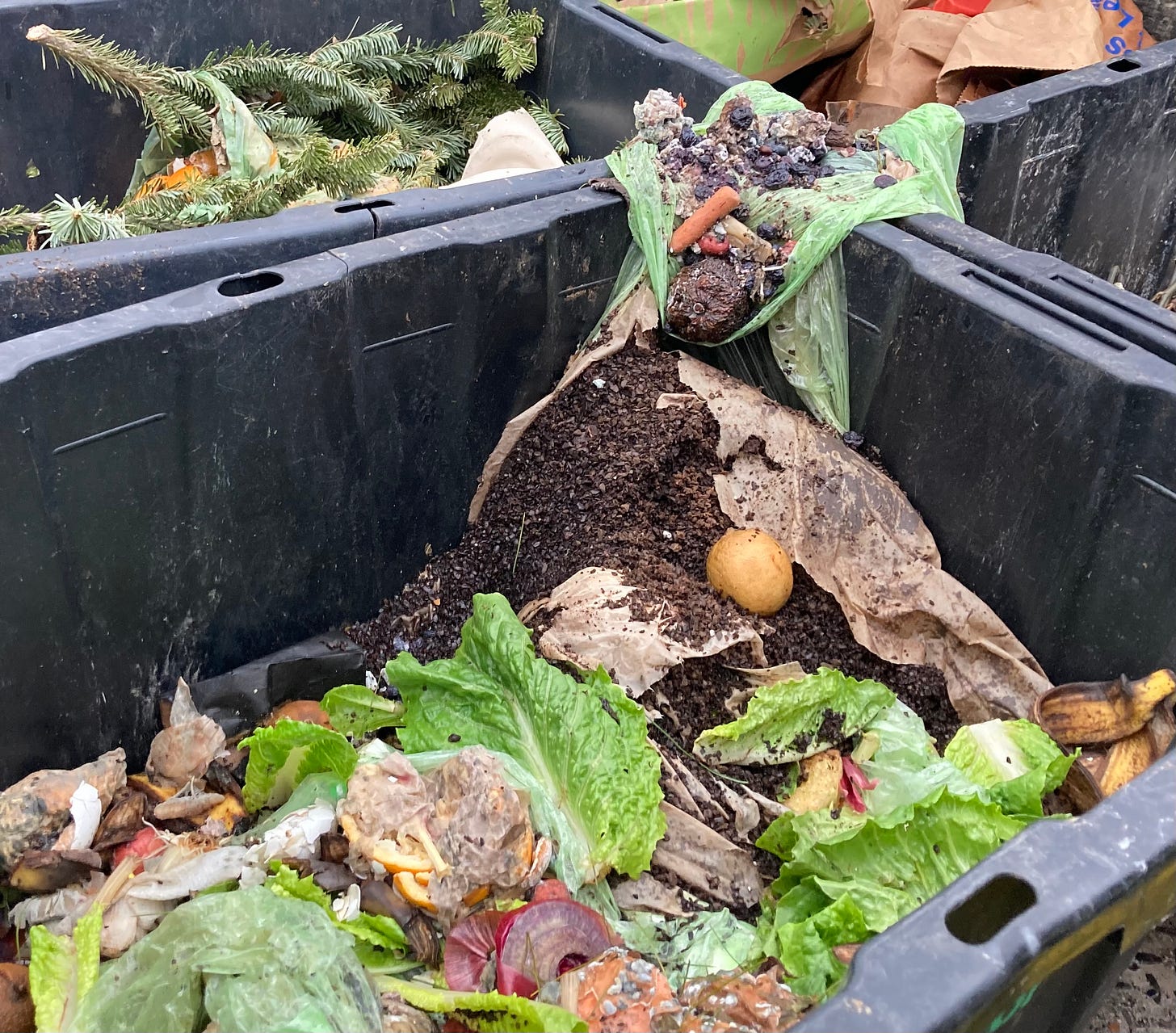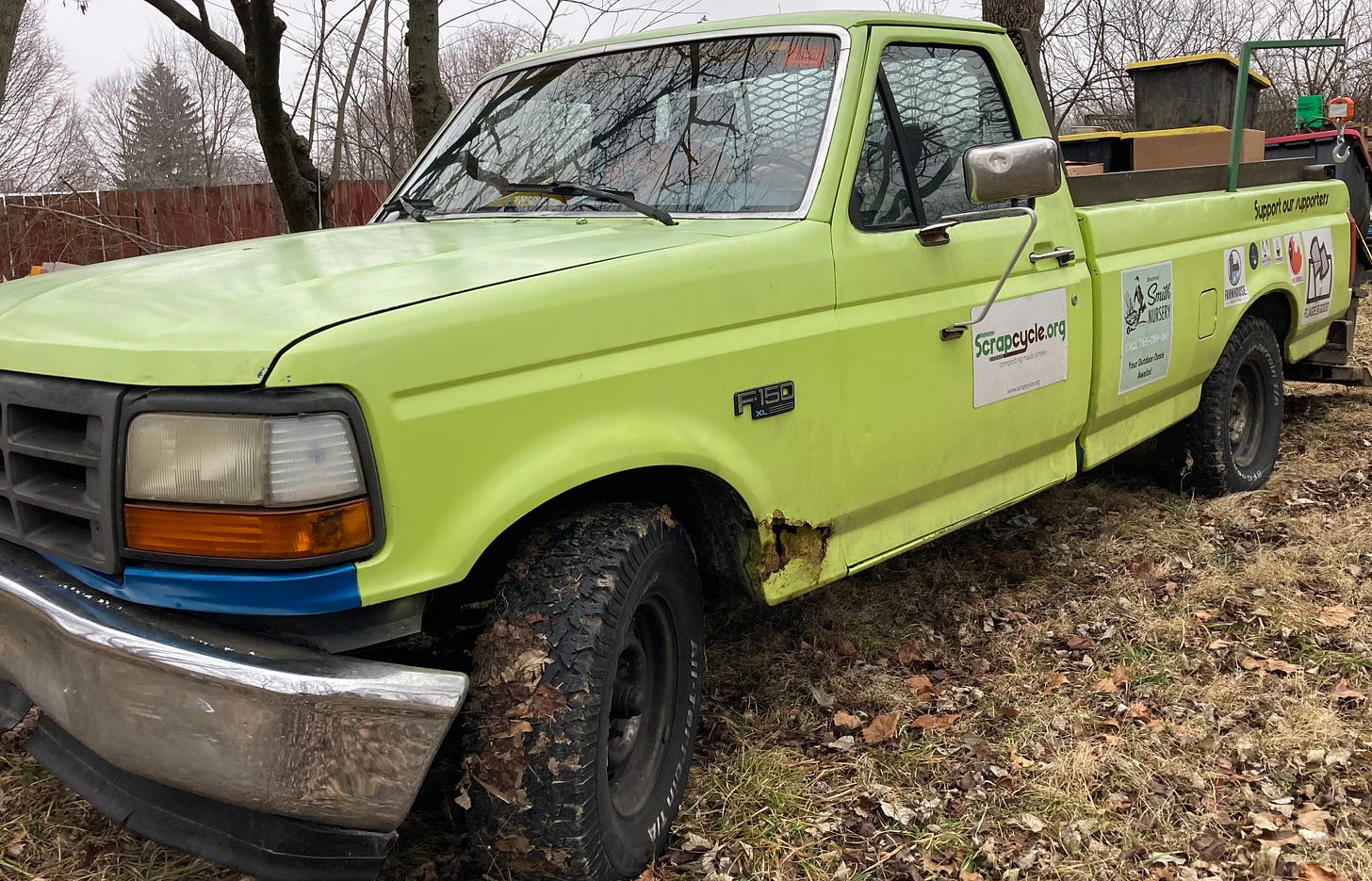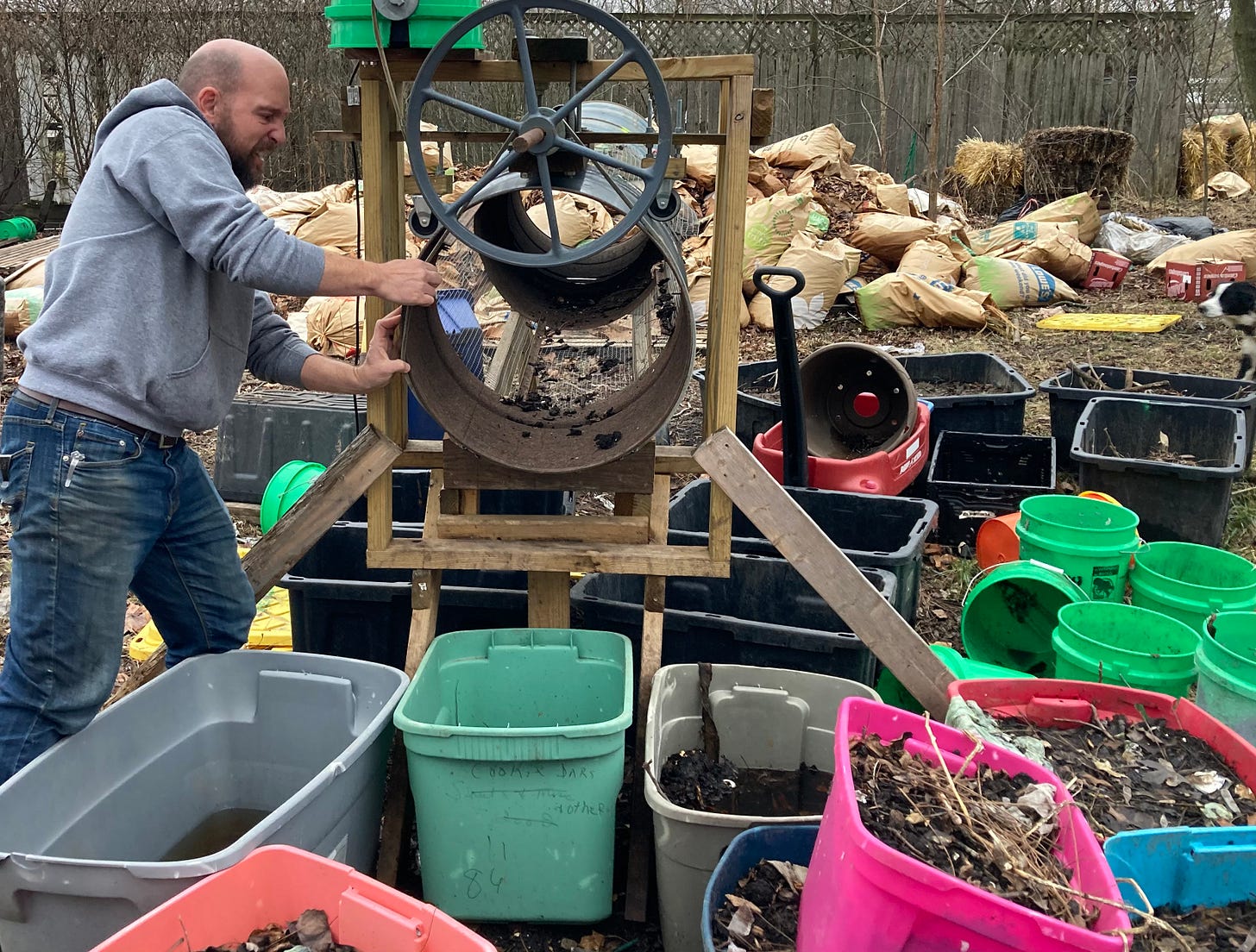Don't trash your garbage; compost it curbside
How Muncie/Yorktown residents can stop their food waste from becoming landfill sludge
MUNCIE — Courtney Bishop liked the idea of composting food scraps from her kitchen but didn’t want to maintain a compost pile or bin in her yard.
So she and her husband became customers of a curbside composting business called ScrapCycle, a decision that felt like “the ultimate environmental easy button.”
“There are many little things we can do to help take care of our planet, like driving to fewer places, using a reusable water bottle, and bringing our own shopping bags to the store, but composting is a pretty big thing we can do,” says Bishop, the treasurer of her neighborhood association and a board member of a community center.
The couple began composting so much that they needed a second one of the five-gallon buckets that ScrapCycle provides to customers and collects biweekly.
In 2020, ScrapCyle joined a list of at least a half dozen food-waste composting entities doing business in Indiana under names like Ground Down, Fort Wayne; Earth Mama Compost, Indianapolis; and EarthKeepers Compost, Bloomington.
“Prevent your food waste from becoming Fort Wayne landfill sludge,” Ground Down tells customers.
Besides keeping it out of landfills where it rots and produces methane — a potent greenhouse gas that contributes to climate change — composting garbage creates a nutrient-rich soil component called humus. It’s a fantastic fertilizer for gardens and farms.
That’s how ScrapCycle got started by Bob Mattax, an engineer at AppHub.com, a software platform for e-commerce merchants.
"I’m very independent,” he said. “I like to know where my stuff comes from.”
Married and the father of four children, Mattax grows his own beets, cucumbers, tomatoes, etc., and raises his own poultry.
The garden requires lots of compost, so he started collecting kitchen scraps (“greens”) as well as dry leaves, egg shells, nut shells and other “browns” from friends and family.
That has grown into a business with more than 150 regular customers in Muncie/Yorktown: paying and non-paying. The paying customers ($12 a month or $120 for a year) get a pickup every two weeks, liners for their buckets, and compost in the spring. Non-payers get picked up only on request. Anyone can receive a free trial.
Sue Weiland has been recycling since age four, starting with newspapers. For the past 25 years, she has composted leaves, twigs, kale stems, orange peels, carrot tops, eggshells, tea bags and so forth in the back yard. She kept a couple of buckets of the resulting decomposed matter for herself but gave most of it to neighbors, Motivate Our Minds, and a community garden.
“But now I'm 67 and have a sacroiliac joint I have to be careful of,” Weiland said in an email. “The compost, as it is just a pile in a corner of the yard and open to the elements, tends to be very heavy when I have to move it, until another year of decomposition makes it into nice black dirt. In September of 2021 I gave up and hired a neighbor's son to move it. But I didn't want to have to do that every year.
“And then I discovered ScrapCycle. It would take everything I had always composted. I couldn't do it myself; they wanted my stuff; it was a natural move.”
But most people aren’t like Weiland, so food waste is the single largest source of trash in landfills, in the neighborhood of 25%.
When they put table scraps in the trash, people mistakenly assume that “smart minds are taking care of it,” Mattax said. “No they’re not.”
“It’s a commodity,” he said of garbage. “We treat it as waste, but there is use for it still, especially in Muncie, which is blighted with brownfields (contaminated soils). We could remediate sites with more composting. I’m interested in things being brought back to life. It’s circular.”
The Indiana Recycling Coalition has changed its name to Circular Indiana, a reference to the circular economy that keeps materials, products and services in circulation for as long as possible.
When I ask Mattax if his compost piles attract any pests, he mentions black soldier flies and worms.
“But again, this is the circle,” he said. To birds, chickens and fish, the worms and the flies are lunch. And the chickens are dinner for the Mattax family.
If you pull a handful of compost out of one of his piles, it’s a dark, crumbly, earthy-smelling material — indicating that Mattax is following the rules, such as aeration and maintaining the right balance between browns and greens.
“When they tell you the scraps don’t smell, they don’t!” ScrapCycle customer Judy Merritt said. “Whether they have been in the bucket for up to two weeks or in the heat of the summer, they still don’t smell like rotting garbage does in your trash can. Not having meat in the scraps is the difference.”
Compost that contains meat can become smelly and attract serious pests, like rats.
“There is no rancid smell,” Mattax said, “because there is no fat breaking down.”
ScrapCycle has partnered with Rosebud Coffee House and is seeking more associates, such as dog groomers and beauty salons for their hair; restaurants; his alma mater, Ball State University, and other institutions. (Mattax’s composting site is the result of a collaboration with Brumond Smith Nursery just south of Muncie. He resides in a historic brick house on the southeast side).
“We go thru 60 pounds of coffee grounds a week,” Rosebud’s Tiara Hicks told me. “We partnered with ScrapCycle as a way of being more environmentally friendly and establishing local partnerships. I feel it is really important to partner with other small local businesses.”
The Muncie Sanitary District provides residents a drop-off site for brush, limbs, grass clippings and leaves at East Central Recycling, in addition to seven weeks or so of curbside leaf pickup in the fall. The material is ground into mulch. MSD also will pick up brush and limbs curbside on trash days with its grapple truck.
But MSD doesn’t compost food waste, which goes to the landfill.
“It would be a large undertaking to initiate and implement a curbside composting program,” MSD recycling educator Jason Donati, himself a backyard composting householder, told me. “(It) would require a large IDEM-permitted site to handle the organic matter and would also require various types of equipment such as a windrow compost turner; a tractor; a large front loader with a bucket for moving material; trucks to pick up the material, and organic-matter Toters for residents to place materials in for pickup. This would obviously require a substantial amount of funding to start such a program, (but ) we are continuously exploring grant opportunities for new and innovative programs.”
Donati is unaware of any local government-run composting operations in Indiana that take table scraps. He cited Columbus as an example of a public entity that offers curbside pickup, in “brown” Toters, of yard waste trucked to a 40-acre municipal site where leaf windrows break down into compost. “I don’t believe they encourage kitchen scraps and food waste to be put in there,” he said. The Bartholomew County Solid Waste Management District confirmed to me that “we are not permitted to accept food waste.”
A native of Wells County, Mattax enrolled at BSU 25 years ago as an undergraduate taking classes in architecture, elementary education and speech communication, disciplines that he says have served him well in addition to a master’s degree in computer science. “Smarter, not harder” was one of the lessons college taught him.
He isn’t paying himself a salary yet at ScrapCycle but says he only works on the venture for about two hours a week. The $20,000 in annual revenue pays for a couple of route drivers, insurance/gas for an old pickup truck, the five-gallon buckets and other expenses, he said.
“I’m more centered on the mission than making it it a lucrative business,” he said, citing bigger cities like Fort Wayne, Indianapolis and Cincinnati where curbside composting organizations are charging $20 to $30 a month “for the same thing I’m doing.”
Mattax’s compost piles are turned by hand with a pitchfork and other tools, but he’d like to grow the business and be able to afford to buy a Bobcat.
He also mentioned the possibility of expanding into plastics, “which can become a commodity if handled right. I think we should deal with it locally, and figure this out,” he says of plastic, garbage and other materials that are landfilled. Participating in the circular economy includes “not always being a consumer” and “dealing with my own mess.”
Previously, in Greater Muncie:






